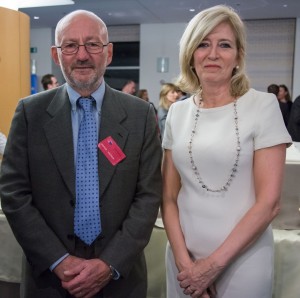 The institution of the European Ombudsman celebrated its first 20 years of activity with a party for staff and all those who have and still are contributing to its work. The shindig was held in the European Parliament.
The institution of the European Ombudsman celebrated its first 20 years of activity with a party for staff and all those who have and still are contributing to its work. The shindig was held in the European Parliament.
In the words of the current Ombudsman, Emily O’Reilly, the Ombudsman’s function “was born out of the debate on the emerging European citizenship in the early 1990s, and its purpose precisely is to enable those European citizens to hold the ever more powerful EU institutions to account, as the direct effect of what they do impacts more and more on the daily lives of the people. It acts in a complementary way to the courts and to the parliament, as a check on EU institutional power.”
In the current climate, O’Reilly’s words may seem like a wish rather than reality. Except that the office’s record in the matter of access to secret clinical data is exemplary. It is to the Ombudsman that the Nordic Cochrane Centre referred in its attempt to access clinical study reports from the European Regulator, the European Medicines Agency (EMA), and it was the Ombudsman who sided with Peter Gotzche and colleagues. This led to the recognition that data relating to clinical trials cannot be considered confidential, as it is a public good.
I have chronicled the evolution of the EMA’s policy and its forthcoming release of large quantities of reports. Reports have also been released since the Ombudsman’s ruling in 2010. The visibility of such documents has finally lead to the realisation that clinical trials published in journals may not be trusted because they do not provide sufficient information and detail to understand the strengths and weaknesses of a trial.
So game, set, and match to the Ombudsman and the data transparency campaigners?
Unfortunately not. I have described the limits of regulatory documents for decision making in medicine elsewhere, so here I will concentrate on a very recent example of why we need the Ombudsman and why we need media coverage of the issues more than ever.
On 5 of November, the EMA issued a press release announcing that the EMA’s Pharmacovigilance Risk Assessment Committee had reviewed current evidence on exposure to any of the three currently registered HPV vaccines and CRPS or POTS, and concluded the evidence did not support an association. The curious acronyms stand for complex regional pain syndrome (CRPS) and postural orthostatic tachycardia syndrome (POTS). These had been reported in young women given HPV vaccines, hence the investigation.
I was curious to read the report and the methods and data used by the committee, so I looked on the EMA’s website with no results and then wrote to the relevant email address. I received a very swift answer telling me that my request had been put in a queue—I’d get a response within two months.
This means that the EMA still thinks that definitive conclusions on public health issues can be made and publicised without providing the supporting evidence at the same time. And that it also thinks we still trust experts, institutions, and (why not) publications and official reports without question. This is a regulatory equivalent of the dictum “you can trust me, I am a doctor.”
This is why we need the Ombudsman, its function, and staff and we need them more than ever.
Tom Jefferson, reviewer, Cochrane Acute Respiratory Infections Group, 00187, Roma, Italy.
Competing interests: TJ was a co-recipient of a UK National Institute for Health Research grant (HTA – 10/80/01 Update and amalgamation of two Cochrane Reviews: neuraminidase inhibitors for preventing and treating influenza in healthy adults and children—http://www.nets.nihr.ac.uk/projects/hta/108001).
TJ receives royalties from his books published by Blackwells and Il Pensiero Scientifico Editore, Rome. TJ is occasionally interviewed by market research companies for anonymous interviews about Phase 1 or 2 pharmaceutical products. In 2011-2013, TJ acted as an expert witness in a litigation case related to oseltamivir phosphate; Tamiflu [Roche] and in a labour case on influenza vaccines in healthcare workers in Canada. In 1997-99 TJ acted as a consultant for Roche, in 2001-2 for GSK, and in 2003 for Sanofi-Synthelabo for pleconaril (an anti-rhinoviral, which did not get approval from the Food and Drug Administration). TJ was a consultant for IMS Health in 2013, and in 2014 was retained as a scientific adviser to a legal team acting on the drug Tamiflu (oseltamivir, Roche). In 2014-15 TJ was a member of two advisory boards for Boerhinger and is in receipt of a Cochrane Methods Innovations Fund grant to develop guidance on the use of regulatory data in Cochrane reviews. TJ has a potential financial conflict of interest in the investigation of the drug oseltamivir. TJ is acting as an expert witness in a legal case involving the drug oseltamivir (Roche). TJ is a member of an Independent
Data Monitoring Committee for a Sanofi Pasteur clinical trial.
